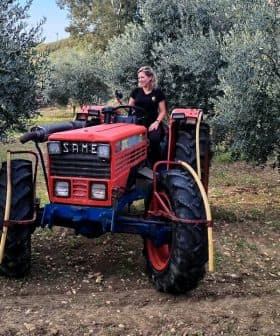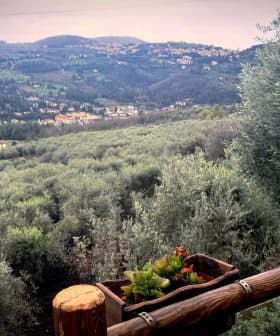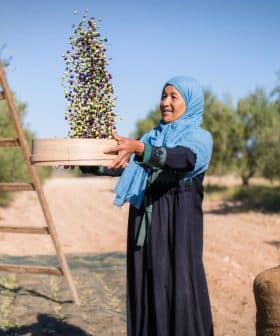 6.4K reads
6.4K readsNews Briefs
Olive Trees Combat Air Pollution, New Research Shows

The VegPM project, coordinated by the University of Florence, identified olive trees as one of the best tree species for cleaning the air and combating air pollution caused by particulate matter in four Italian municipalities in Tuscany. The project collected data on indigenous plants that could improve air quality, with olive trees showing a high capacity to accumulate fine and ultrafine particles, making them promising candidates for urban environments.
Olives are among the tree species that can best contribute to cleaning the air, according to the results of VegPM, a research project coordinated by the University of Florence. This project aimed to identify the most suitable indigenous plants for combating air pollution caused by particulate matter (PM).
Launched in 2020 and supported with 180.000 euros by the Cassa di Risparmio di Lucca Foundation, the VegPM project gathered data from four Italian municipalities in Tuscany affected by high levels of fine particles: Lucca, Porcari, Capannori and Altopascio. In addition to olive trees, the research team revealed that Laurel (Laurus nobilis), Privet (Ligustrum), Oleander (Nerium oleander), Magnolia (Magnolia grandiflora) and Cherry laurel (Prunus laurocerasus) could also improve air quality.
Particulate matter is a mixture of solid and liquid particles – organic and inorganic. These particles are dispersed in the air and are highly dangerous for human health. Road traffic is the primary PM source, but heating systems, waste management and agriculture can also cause an excess of PM.
Particles are commonly classified by their diameter into three categories: “coarse” (PM10), “fine” (PM2.5) and “ultrafine” (PM0.2). The size of the particles determines how they affect the respiratory system and enter the bloodstream.
See Also:Health NewsProlonged exposure to PM10, in particular, can cause severe effects, such as cardiovascular and respiratory discomfort, chronic allergies, and even premature mortality in children. Epidemiological studies have also shown that the proximity of busy roads is associated with chronic respiratory diseases in children and the elderly. In an urban environment, these harmful effects can be intensified by dangerous heavy metals caused by exposure to oils, tires, fuel, metallic paints and waste.
Therefore, developing practical mitigation actions is one of the most critical challenges for local governments. Many municipalities have looked into designing effective “urban forests.” These require appropriate plant species to be planted along roadways or near highly polluted areas. For this new strategy to work, the plants chosen should respond to water stress and contain CO2 levels.
The VegPM project makes the entire area encompassing Lucca, Porcari, Capannori and Altopascio – about 100 km² – the innovative urban green model testing location. Lucca, Porcari, Capannori and Altopascio have the highest concentrations of PM10, nitrogen dioxide and ozone in all of Tuscany, according to the yearly regional air quality map released by Arpat.
“Some plant species can act as natural filters of particulate matter by intercepting and retaining particles on their leaf surfaces: Our goal was to identify, test and select the most promising among the native species of our climatic niche in order make them ideal candidates for undertaking local actions to significantly reduce air pollution,” says project coordinator Federico Martinelli, associate professor of Genetics at the Department of Biology of the University of Florence.
“As a first step, we made an extensive screening of the available species capable of adsorbing/trapping more PM, heavy metals and ozone: We combined pathophysiological studies with molecular analysis and genotyping techniques made available by the sequencing equipment available in the Department of Biology of the University of Florence, so to understand the molecular mechanisms that underlie the modulation of positive characteristics. Then, in 2021, in cooperation with the National Research Council of Italy, we launched the experimental part of the project by setting up a network of sixteen control units throughout the area, capable of monitoring the main air pollutants and collecting both quantitative and qualitative data. By integrating the values recorded by the monitoring centers with the particulate accumulated in the leaves of each species analyzed, we were able to rank the species with the highest PM deposition values.”
Researchers picked separate leaf samples for every tree. The deposition values of each PM fraction were compared and analyzed against the average particulate matter levels recorded throughout the year. Using this process, researchers could rank each species according to their ability to accumulate fine and ultrafine particles. They found that olive trees, in particular, demonstrate a high accumulation capacity.
“This feature, along with their ability to tolerate stresses such as drought and salinity, makes them one of the most promising candidates. In urban context, their presence is even more important because they naturally absorb carbon dioxide and release oxygen, essential for the life of every human being.”
Given the experimental results of the VegPM project, the researchers hope that more research will be undertaken and show the ability of certain trees to negate the harmful effects of living in an urban environment.
“For now, our studies have focused only on existing plants. But what would it happen on new, planted plants? Would the PM concentration decrease more? I hope this question could stimulate a follow-up of the project,” Martinelli adds.









